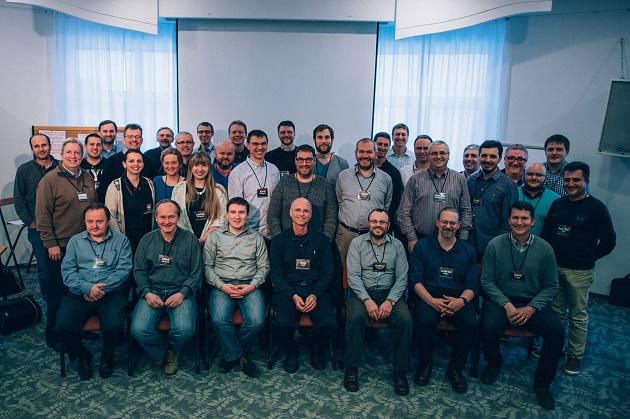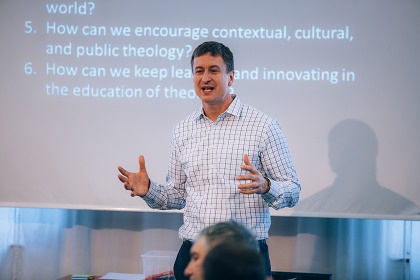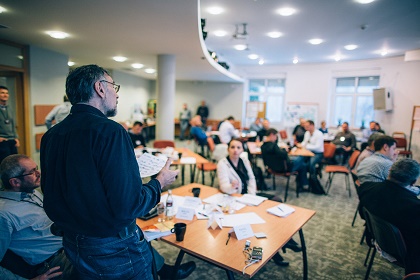Representatives of 11 countries met in the Czech Republic to discuss the present and future of theological education in Central and Eastern Europe.
 Group photo of participants and facilitators of the gathering. / KAM, Josiah Venture Czech Republic
Group photo of participants and facilitators of the gathering. / KAM, Josiah Venture Czech Republic
Representatives of theological education institutions from 11 Central and Eastern European countries gathered in Malenovice in the Czech Republic (December 5 – 7, 2016) to consider the present and future of theological education and pastoral training in their nations.
The gathering was organized primarily by Josiah Venture, with the support of the Czech Evangelical Alliance. The impetus for the gathering was the recent publication of the research of Dr. Steve Patty, the result of a joint project of Josiah Venture and Mission Eurasia, in partnership with Dialogues in Action, on the state of theological education in Central and Eastern Europe.
The research itself involved Dr. Patty having conversations with a variety of ‘stakeholders’ in theological education in the specified region. He spoke with people in three broad categories: those currently invested in theological education institutions – educators and school administrators; local churches – pastors and elders and church leaders; and emerging leaders – potential and/or current students of theological education.
 Presentation of research by Dr. Steve Patty. /KAM, Josiah Venture Czech Republic
Presentation of research by Dr. Steve Patty. /KAM, Josiah Venture Czech RepublicDr. Patty’s findings on the state of theological education reveal a mix of past diligence, present uncertainty, and then despite the present uncertainty innovative and hopeful solutions being discovered.
MOBILIZATION CENTERS FOR CHURCHES
Delegates had the opportunity to wrestle with some very challenging questions. These included questions about the relationship with academic theological education and ‘whole-person’ discipleship in the local church, questions about how theological schools such a seminaries and theological faculties can and should measure their success, how to develop more effective means for emerging leaders to consider the possibility of a ministry calling and the importance of theological education in the training and preparation for pastoral ministry.
At one point, there was discussion around the question of whether the general lack of students in seminaries was more a crisis of education or a crisis regarding how pastoral ministry is defined.
Dr. Patty outlined certain perspective shifts in his research that he calls, ‘promising mental models.’ Part of the discussion revolved around delegates considering how these promising mental models could help re-invigorate theological education in the months and years ahead. For example, one of the challenges academic theological institutions face is the fragmentation that is occurring in secular European society and culture. One promising mental model is a shift away from the idea that a theological school gathers scholars together to the idea that theological schools are mobilization centers for the churches.
TWO EXAMPLES: UKRAINE AND ROMANIA
Delegates examined instances where institutions, national denominations, and local churches are experimenting with innovative and potentially helpful new directions. The Ukrainian Baptist Theological Seminary, for example, made a significant shift in their approach by recognizing that their seminary existed to serve the local churches. As a result of reorganizing their operations around the goal of providing effective pastors who are Biblical, missional, and accountable, the seminary went from 35 to over 350 students in just three years.
Another example: the Pentecostal Church in Romania. This young denomination has grown rapidly and is now in fact the fastest growing church in Europe, with over 3,000 local congregations engaging over 500,000 people. The church is now organized in 9 regional districts, each of which provides a training center. These training centers provide up to 2 years of practical training for church leaders. Those who demonstrate an aptitude and calling are then able to move up to a higher level of education at the denominational seminary or the state university faculty.
 Discussion of potential action points. / KAM, Josiah Venture Czech Republic
Discussion of potential action points. / KAM, Josiah Venture Czech RepublicThese are just two of many examples. Other innovative experiments and projects include the Baltic Pastoral Institute in Latvia, TCMI based in Austria, the Academy of Homiletics in Poland, and the Department of Theology and Catechism of Matej Bel University in Slovakia.
DIALOGUE TO WORK TOGETHER
The consultation concluded with delegates making concrete and practical plans for the improvement of theological education in their respective institutions, denominations, and nations. In many cases there was recognition of a need to improve the relationships between seminaries and churches, and a variety of schemes were started through which seminary leaders hope to improve their dialogue with denominational leaders.
The challenges faced by theological education will continue in part due to the ongoing and increasingly rapid changes in European culture and society. Unfortunately, this means there are probably not easy or even permanent solutions for these constantly evolving challenges. But due to efforts such as this consultation, in which leaders gathered to pray, confer, and plan, there are good reasons to be confident about the future of theological education in Central and Eastern Europe.

Las opiniones vertidas por nuestros colaboradores se realizan a nivel personal, pudiendo coincidir o no con la postura de la dirección de Protestante Digital.
Si quieres comentar o